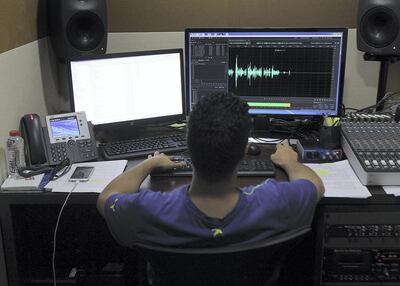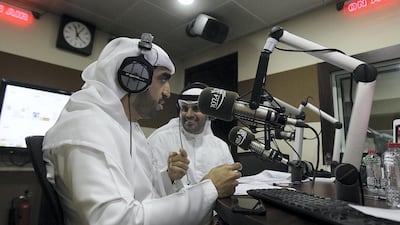For midnight travellers, Ramadan is experienced through the car radio when prayers and talk shows are broadcast live. Listeners are invited to join intimate conversations on ethics, religion and culture.
At Al Oula radio station in Dubai's Media City, midnight is prime time for Ramadan programming. Pre-recorded shows are relegated to the day and live talk shows are broadcast at night after iftar and Taraweeh prayers.
Ramadan is one of the busiest seasons of the year and preparations for the holy month begin in January.
“You know, more people listen to the radio in Ramadan because they have enough time and they have this rest period from 2pm until iftar,” says Nathalie Awadissian, the production and programmes manager at Al Oula FM, which is broadcast on frequency 107.4. “So they have to either listen to the radio or watch TV.”
Midnight shows are the most popular of all. At this hour, guests and listeners are at their most loquacious.
To accommodate this, a skeleton staff of about seven work at through the night. At midnight, it is just a few technicians and presenters, a producer, director and a security guard in an otherwise empty and dark office.
No music can be played in Ramadan. Without music to fill intervals, the month has 14 shows instead of the usual eight and each show airs daily. At night, everything is live.
Live broadcasting during the day is a recipe for disaster, explains Ms Awadissian. Fasting guests lack the energy for banter and there is no option of cutting to music when conversation slows.
Half of the daytime programming is pre-recorded.

“During the day, especially early morning, most of the guests are not available,” says Ms Awadissian. “Sometimes they are fasting and they cannot talk too much. This is very difficult for them and it’s very risky for me if they will not talk during the day because I don’t have songs.
“That’s why the shows why the night shows are more active, are more alive, are entertaining.”
Radio became part of the Ramadan tradition in the mid-fifties, when the Egyptian radio pioneer Amal Fahmi asked the first Ramadan riddle on a Cairo radio station. This was the beginning of the nightly fawazeer, or riddles, posed to listeners at the end of TV and radio programmes in Ramadan. By the 1960s, the Ramadan fawazeer had migrated to Egyptian television and soon spread to the Gulf.
Ramadan radio in the UAE is still synonymous with games and prizes.
“Ramadan means competition, it means prizes,” says Ms Awadissian. “Every occasion has to have gifts so ‘Ramadan Kareem’, they say, when they have some prize for you.”
TV and radio games carry a special nostalgia for presenters.
“I remember trying to call TV shows in order to have the chance to win those prizes,” recalls Ahmed Al Bedwawi, a presenter at Al Oula Radio. “It brings up a lot of nice memories and then there’s the fact that people like the monetary prize before Eid.”
Shows are broadcast live on Instagram and YouTube after iftar.
The station, run by the Hamdan Bin Mohammed Heritage Centre, is dedicated to promoting national heritage. Shows are all in Emirati Arabic but many app users listen from the UK and India.
______________
Read more:
Ramadan businesses: Tent companies busy in the holy month
Midnight in Ramadan: Coals burn late into the night at Khalidiya's Family Park
Mosques of the UAE: 100-year-old mosque built by pearl diver has stood test of time
______________
Presenters have no trouble switching to midnight scheduling. “I’m a night person to be honest,” says Al Bedwawi.
His is a relatively early shift. He takes to the airwaves following Taraweeh prayers, from 10pm until 11pm. “It’s a prime time for people who are leaving the mosque to go to visit their families which is a good time to have a programme.”
In his programme, After Taraweeh, a different positive habit is discussed each day.
“The thing about Ramadan is that it’s a holy month so whatever you do, you have to associate it with the good things in our life,” says Al Bedwawi. “You don’t want to end up lecturing people so you try to associate Ramadan with their good habits.”
Without the distraction of meals, he can focus on his work and community. “I find myself able to do more in Ramadan.”
Just before midnight, the next set of guests arrive at the station. It may be late but, Al Bedwawi insists, the night is young.

